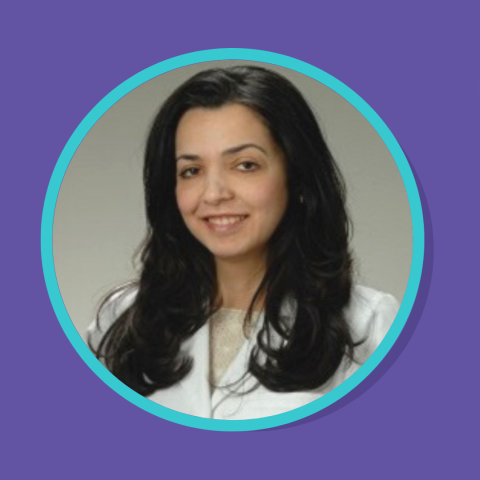
Fatima Karzai, M.D., Associate Research Physician and Clinical Director in the Genitourinary Malignancies Branch
Fatima Karzai, M.D., Associate Research Physician and Clinical Director in the Genitourinary Malignancies Branch, is a clinical researcher working on prostate cancer clinical trials at CCR. She is originally from Afghanistan. For this Asian American, Native Hawaiian, Pacific Islander Heritage Month Q&A, she discussed her research interests, the importance of mentorship and how her background as an Afghan American woman influences her work today.
Why did you want to become a clinical researcher?
I always knew that I wanted to be a physician. The connections you have with your patients and the way that that relationship develops is very fulfilling, particularly in oncology, but one of the things I never thought I would do is be a clinical researcher. Being a clinical researcher is a different path that most people know little about, where you can do research AND see patients. I think it was fortuitous for me to complete my hematology-oncology fellowship here at the NCI and the National Heart, Lung, and Blood Institute (NHLBI).
What made you decide to join CCR as opposed to anywhere else to achieve your research goals?
I was able to take what I'm interested in —working with patients — and collaborate with others at CCR on the basic and translational side. I can collaborate and bring new ideas into clinical trials to treat patients. These collaborations within and outside the CCR have made what I do so much more fruitful. That's why I wanted to continue my career here at the NCI. It gives me the opportunity to be able to conduct clinical research and fulfill my scientific curiosity.
Do you think your background as an Afghan American woman affected or influenced your career in medicine and research?
Definitely. I am a refugee from Afghanistan, I came to the United States when I was very young. I never thought of myself as a female in science or medicine: I knew this is what I wanted to do. And I had a very supportive family and friends. What has changed now is that I've realized that being an Afghan American, being a female, really does affect all aspects of my job. It’s a wake-up call for me to know that I was able to do this while some other females would have never been given this opportunity, or the ability to pursue this career. It makes me very grateful.
I think that being a minority and being a female, your career in medicine and science is disproportionately harder. And I think that we are starting to have those conversations, but we need to continue to have them. There needs to be more support in trying to get females and underrepresented minorities into medicine and science because I think it enhances the field.
Does your work have a health disparities aspect? And if it doesn't now, can you see a path forward where it might?
We at the Genitourinary Malignancies Branch strive to recruit diverse populations onto our trials. One of the things that we've been working on is trying to get more patients, especially African American men, onto the clinical trials because if we can try to figure out how to understand differences in disease onset and progression, in specific populations, we could potentially see different outcomes in prostate cancer.
I’m interested in trying to expand clinical trial eligibility and trying to understand the biological and genomic differences in prostate cancer. There are underlying differences in cancers themselves but social determinants of health are hard to separate from outcomes. Variables such as socioeconomic status, diet and exercise are all interconnected and need further study.
Can you share any advice that you've received throughout your career that's made a positive difference for you?
One important piece of advice I’ve gotten is to advocate for yourself. As women, it's very difficult for us to do that. We are socialized in society to not nominate ourselves for opportunities or speak up for ourselves. You have to learn how to think about what you want to do and how to get there. It’s a skill that we all have to learn.
Another thing to know is that you're never alone. You can always seek out mentorship and support.
What kind of impact do you want to have at CCR and beyond?
I want to be able to take what I've learned and expand that as much as I can for patients. I want to get more involved in mentoring females in medicine and trying to make things better for people who may not think of this as a career. Access and encouragement are very important.
And to women or students of color of the next generation: if science is what you are interested in, you should pursue it wholeheartedly. There will be barriers, and your path might look different from the paths of others: it’s rarely a straight line. And you may plateau or fail, but that is ok. I think that it's always important to pursue your passion. I never thought that I would be an Afghan American woman doing clinical research in prostate cancer, but here I am.